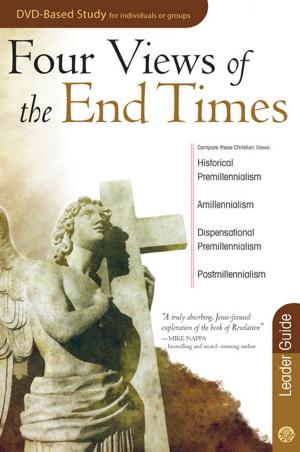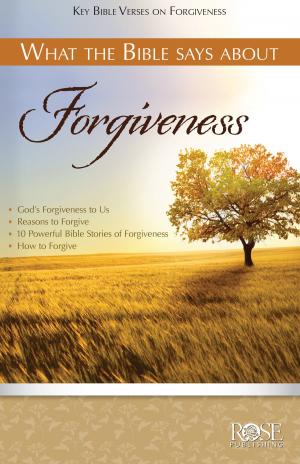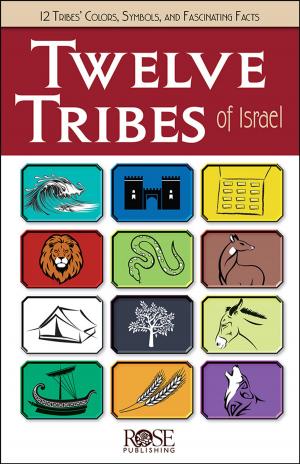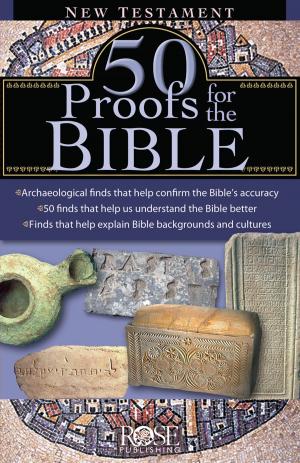| Author: | Rose Publishing | ISBN: | 9781628620191 |
| Publisher: | Rose Publishing, Inc. | Publication: | December 16, 2013 |
| Imprint: | Rose Publishing, Inc. | Language: | English |
| Author: | Rose Publishing |
| ISBN: | 9781628620191 |
| Publisher: | Rose Publishing, Inc. |
| Publication: | December 16, 2013 |
| Imprint: | Rose Publishing, Inc. |
| Language: | English |
The Ten Commandments
The Ten Commandments is an ideal Bible study resource for youth and adults. This ebook can be read in 30 minutes and shows both the traditional and contemporary wording of each of the 10 Commandments, a principle and the meaning of each commandment, what Jesus taught about the commandments, and why the 10 Commandments are important today.
Below is an example of the information you will find in The Ten Commandments:
•Commandment 3 - Do Not Misuse God's Name
•Thou shalt not take the name of the LORD thy God in vain.
•Principle-
•God's name is holy, powerful and glorious.
•Meaning-
•God's name is holy and should be treated with respect. there is power in the LORD's name and it shouldn't be used lightly. Because God is Spirit, we know Him through what He says about Himself, to take His name in vain violates God's nature. As God's creation, everything a person says and does should be done in order to praise and glorify God. (1 Corinthians 10:31)
•Bible examples-
•When a man named Shelomith blasphemed the name of God with a curse, the Lord commanded that he be taken outside the camp and stoned to death. (Leviticus 24:10-16)
•Jesus was accused of blasphemy because He claimed to be God. (John 10:33)
•James warned believers to watch what they say because the tongue is capable of evil and poison and can easily corrupt a person. (James 3:5-9)
•Jesus' Teaching-
•Jesus said, "...every sin and blasphemy will be forgiven men, but the blasphemy against the Spirit will not be forgiven...But I tell you that men will have to give account on the day of judgment for every careless word they have spoken. For by your words, you will be acquitted, and by your words you will be condemned." (Matthew 12:31, 36, 37)
•Jesus said to begin praying with: "Our Father in heaven, hollowed be your name." (Matthew 6:9)
•Explanations:
•Jews and Jewish scribes would go to great measures in order to avoid saying or writing the LORD's name for fear of blasphemy. The Bible says we are to pray, heal, and baptize in Jesus' name. (Matthew 28:19, Mark 16:17, John 14:13, Acts 3:6)
•The Bible says that what we say is very important and it is a glimpse into who we are (James 3:9-12). God loves us and wants us to love and worship Him in whatever we are doing and at all times. God wants us to use His name; it is holy and powerful. If we can show respect for the names of our fathers, mothers, teachers and doctors, then how much more should we respect the name of our sovereign God.
The Ten Commandments breaks the 10 Commandments into two main divisions: commandments about our relationship to God and commandments about our relationship to other people. This ebook is also a great resource on the history of the commandments and why The Ten Commandments were revolutionary for their time.
The Ten Commandments is an ideal Bible study resource for youth and adults. This ebook can be read in 30 minutes and shows both the traditional and contemporary wording of each of the 10 Commandments, a principle and the meaning of each commandment, what Jesus taught about the commandments, and why the 10 Commandments are important today.
Below is an example of the information you will find in The Ten Commandments:
•Commandment 3 - Do Not Misuse God's Name
•Thou shalt not take the name of the LORD thy God in vain.
•Principle-
•God's name is holy, powerful and glorious.
•Meaning-
•God's name is holy and should be treated with respect. there is power in the LORD's name and it shouldn't be used lightly. Because God is Spirit, we know Him through what He says about Himself, to take His name in vain violates God's nature. As God's creation, everything a person says and does should be done in order to praise and glorify God. (1 Corinthians 10:31)
•Bible examples-
•When a man named Shelomith blasphemed the name of God with a curse, the Lord commanded that he be taken outside the camp and stoned to death. (Leviticus 24:10-16)
•Jesus was accused of blasphemy because He claimed to be God. (John 10:33)
•James warned believers to watch what they say because the tongue is capable of evil and poison and can easily corrupt a person. (James 3:5-9)
•Jesus' Teaching-
•Jesus said, "...every sin and blasphemy will be forgiven men, but the blasphemy against the Spirit will not be forgiven...But I tell you that men will have to give account on the day of judgment for every careless word they have spoken. For by your words, you will be acquitted, and by your words you will be condemned." (Matthew 12:31, 36, 37)
•Jesus said to begin praying with: "Our Father in heaven, hollowed be your name." (Matthew 6:9)
•Explanations:
•Jews and Jewish scribes would go to great measures in order to avoid saying or writing the LORD's name for fear of blasphemy. The Bible says we are to pray, heal, and baptize in Jesus' name. (Matthew 28:19, Mark 16:17, John 14:13, Acts 3:6)
•The Bible says that what we say is very important and it is a glimpse into who we are (James 3:9-12). God loves us and wants us to love and worship Him in whatever we are doing and at all times. God wants us to use His name; it is holy and powerful. If we can show respect for the names of our fathers, mothers, teachers and doctors, then how much more should we respect the name of our sovereign God.
The Ten Commandments breaks the 10 Commandments into two main divisions: commandments about our relationship to God and commandments about our relationship to other people. This ebook is also a great resource on the history of the commandments and why The Ten Commandments were revolutionary for their time.
The Ten Commandments
The Ten Commandments is an ideal Bible study resource for youth and adults. This ebook can be read in 30 minutes and shows both the traditional and contemporary wording of each of the 10 Commandments, a principle and the meaning of each commandment, what Jesus taught about the commandments, and why the 10 Commandments are important today.
Below is an example of the information you will find in The Ten Commandments:
•Commandment 3 - Do Not Misuse God's Name
•Thou shalt not take the name of the LORD thy God in vain.
•Principle-
•God's name is holy, powerful and glorious.
•Meaning-
•God's name is holy and should be treated with respect. there is power in the LORD's name and it shouldn't be used lightly. Because God is Spirit, we know Him through what He says about Himself, to take His name in vain violates God's nature. As God's creation, everything a person says and does should be done in order to praise and glorify God. (1 Corinthians 10:31)
•Bible examples-
•When a man named Shelomith blasphemed the name of God with a curse, the Lord commanded that he be taken outside the camp and stoned to death. (Leviticus 24:10-16)
•Jesus was accused of blasphemy because He claimed to be God. (John 10:33)
•James warned believers to watch what they say because the tongue is capable of evil and poison and can easily corrupt a person. (James 3:5-9)
•Jesus' Teaching-
•Jesus said, "...every sin and blasphemy will be forgiven men, but the blasphemy against the Spirit will not be forgiven...But I tell you that men will have to give account on the day of judgment for every careless word they have spoken. For by your words, you will be acquitted, and by your words you will be condemned." (Matthew 12:31, 36, 37)
•Jesus said to begin praying with: "Our Father in heaven, hollowed be your name." (Matthew 6:9)
•Explanations:
•Jews and Jewish scribes would go to great measures in order to avoid saying or writing the LORD's name for fear of blasphemy. The Bible says we are to pray, heal, and baptize in Jesus' name. (Matthew 28:19, Mark 16:17, John 14:13, Acts 3:6)
•The Bible says that what we say is very important and it is a glimpse into who we are (James 3:9-12). God loves us and wants us to love and worship Him in whatever we are doing and at all times. God wants us to use His name; it is holy and powerful. If we can show respect for the names of our fathers, mothers, teachers and doctors, then how much more should we respect the name of our sovereign God.
The Ten Commandments breaks the 10 Commandments into two main divisions: commandments about our relationship to God and commandments about our relationship to other people. This ebook is also a great resource on the history of the commandments and why The Ten Commandments were revolutionary for their time.
The Ten Commandments is an ideal Bible study resource for youth and adults. This ebook can be read in 30 minutes and shows both the traditional and contemporary wording of each of the 10 Commandments, a principle and the meaning of each commandment, what Jesus taught about the commandments, and why the 10 Commandments are important today.
Below is an example of the information you will find in The Ten Commandments:
•Commandment 3 - Do Not Misuse God's Name
•Thou shalt not take the name of the LORD thy God in vain.
•Principle-
•God's name is holy, powerful and glorious.
•Meaning-
•God's name is holy and should be treated with respect. there is power in the LORD's name and it shouldn't be used lightly. Because God is Spirit, we know Him through what He says about Himself, to take His name in vain violates God's nature. As God's creation, everything a person says and does should be done in order to praise and glorify God. (1 Corinthians 10:31)
•Bible examples-
•When a man named Shelomith blasphemed the name of God with a curse, the Lord commanded that he be taken outside the camp and stoned to death. (Leviticus 24:10-16)
•Jesus was accused of blasphemy because He claimed to be God. (John 10:33)
•James warned believers to watch what they say because the tongue is capable of evil and poison and can easily corrupt a person. (James 3:5-9)
•Jesus' Teaching-
•Jesus said, "...every sin and blasphemy will be forgiven men, but the blasphemy against the Spirit will not be forgiven...But I tell you that men will have to give account on the day of judgment for every careless word they have spoken. For by your words, you will be acquitted, and by your words you will be condemned." (Matthew 12:31, 36, 37)
•Jesus said to begin praying with: "Our Father in heaven, hollowed be your name." (Matthew 6:9)
•Explanations:
•Jews and Jewish scribes would go to great measures in order to avoid saying or writing the LORD's name for fear of blasphemy. The Bible says we are to pray, heal, and baptize in Jesus' name. (Matthew 28:19, Mark 16:17, John 14:13, Acts 3:6)
•The Bible says that what we say is very important and it is a glimpse into who we are (James 3:9-12). God loves us and wants us to love and worship Him in whatever we are doing and at all times. God wants us to use His name; it is holy and powerful. If we can show respect for the names of our fathers, mothers, teachers and doctors, then how much more should we respect the name of our sovereign God.
The Ten Commandments breaks the 10 Commandments into two main divisions: commandments about our relationship to God and commandments about our relationship to other people. This ebook is also a great resource on the history of the commandments and why The Ten Commandments were revolutionary for their time.















